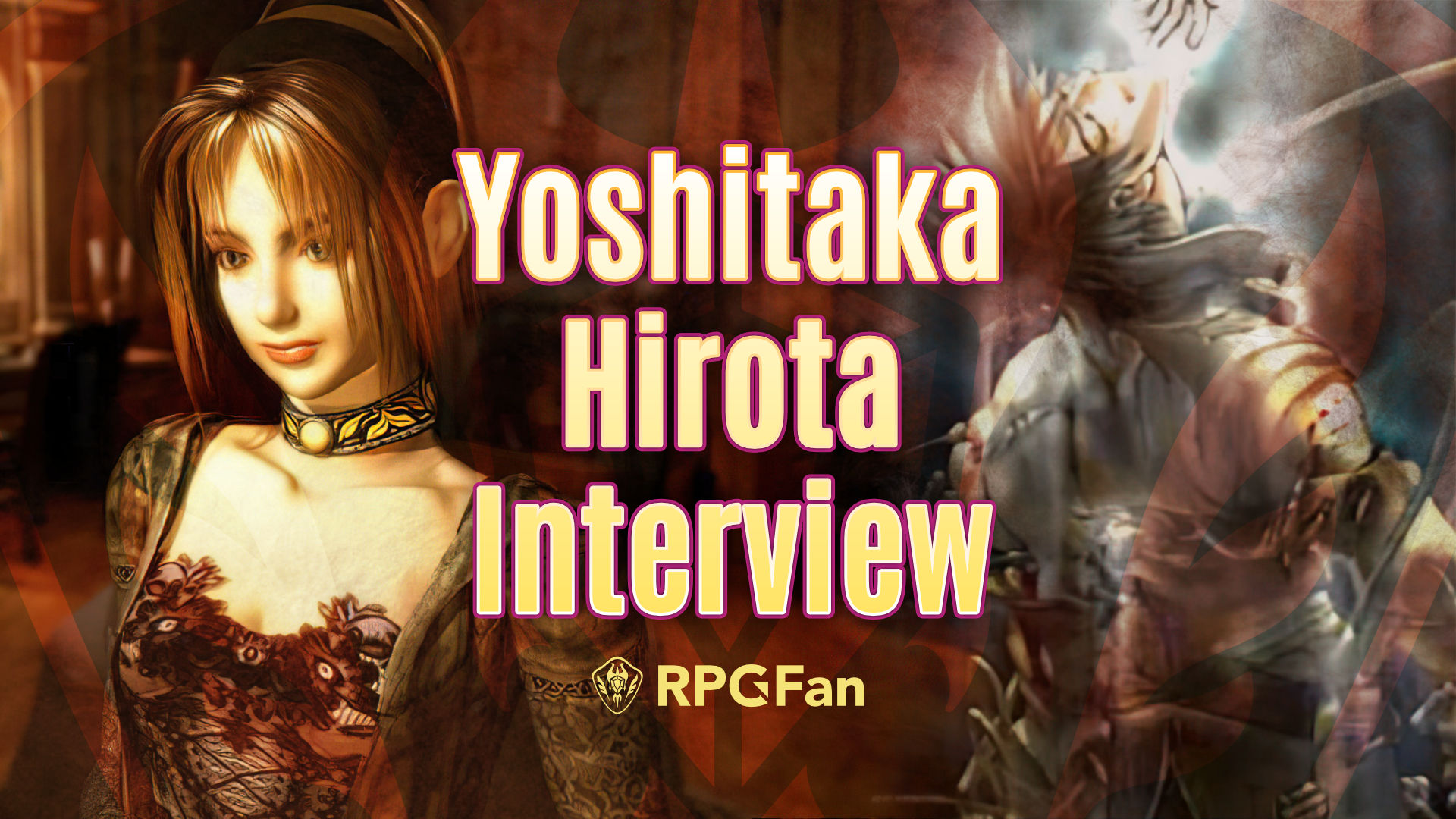Yoshitaka Hirota is a composer, sound designer, and musician whose work you may be most familiar with from the Shadow Hearts series. The games became cult favourites, and anyone who’s played them will know how memorable their soundtracks are: a testament to the lasting power of music in video games. Today, he joins us to discuss his experiences on the Shadow Hearts series and give us some insight into how his career in the industry began. From Chrono Trigger and Final Fantasy VI through to EGGLIA Rebirth, Hirota’s diverse portfolio lends itself to some fascinating stories. Without further ado, let’s begin our deep dive into the works of one of my personal icons in gaming sound design.
Mr. Hirota was kind enough to supply us with responses to our questions in Japanese AND English, so you can read this interview in Japanese as well:
RPGFan: Hello Hirota-san! Thank you so much for taking the time to join us here at RPGFan for an interview. It’s a privilege to have this opportunity.
Hirota: Thank you too! I’m happy to share my experiences and what I’m thinking about now with you.
RPGFan: Let’s take things from the beginning! Your career in the games industry ranges from sound design and engineering to composition. How old were you when you first discovered an interest in music?
Hirota: I would like to work on a project where all the sounds are harmonious and effective. This includes music, sound effects, sound effects for the user interface, and voices. For this purpose, I need to think about the specification of sound from the early stage of planning and discuss it with the development staff. My main job is to compose, arrange, record, and mix music, but I also have the opportunity to work on sound specifications, create sound effects, and edit voices. If possible, I will do all of this myself, or I may form a team to take on these tasks depending on the scale of the work.
My older brother, who is nine years older than me, has been playing acoustic guitar beside me since I was a small child. I used to fall asleep every night listening to the sound of his guitar coming from his room. The guitar was so close to me, so natural, that I believed that all of us would learn to play it when we grew up. It was so close to me that I was not as enthusiastic about the guitar as I should have been. However, when I became a teenager and experienced the heavy bass sound of ROCK Bass right next to the bass amp at the music club, I was shocked by its power. I was fascinated by the coolness of the sound and have continued to play the bass ever since.
And my brother has been learning computer programming since the early 80s. Since I was a child, I became interested in computers as well as music because of his influence. I used to go to the electronics store on my own on Sunday mornings. I would spend the whole evening typing in BASIC program games from magazines on the 8-bit computers on display at the store, run them, play the games, and then leave. Before long, I was writing down on paper the games I had made using BASIC, inputting them, and playing them.
RPGFan: Some of your first credits in sound design are from Square classics such as Final Fantasy VI and Chrono Trigger: how did you get involved with these projects?
Hirota: When I was 21, I was playing bass, DJing, composing, and remixing, but my income from those jobs was small. I was always broke. My friend Yasunori Mitsuda, who was working at SQUARE, was going to compose the music for Chrono Trigger and contacted me to see if I would be interested in working for SQUARE making sound effects. I am very grateful to him for giving me the opportunity to start working with video games.
I started working on LIVE A LIVE in the latter half of its development, and then worked on FFVI. Then I created the sound effects for Chrono Trigger. At that time, my bosses were working on the sound specifications and directing the project. I was focused on creating the sound effects they wanted.
In the SNES sound system, I learned to create complex waveforms from simple waveforms using the technique of modulating one waveform by adding another waveform to it. I used sine waves and noise to create sounds like breaking glass. I applied this technique to make Terra’s beastly scream at the beginning of FFVI. I further developed this technique to create a so-called robot voice (vocoder) and created the voice of Robo in Chrono Trigger. I made it as an experiment, but my boss listened to it and suggested that we make Robo talk at the conference. In other words, my sound, which had not been planned at first, was adopted. I remember how happy I was that my idea and technology made Robo talk. I think Terra’s voice was also an unplanned sound effect.
After that, I continued to participate in many projects at SQUARE. Since I had other composing and performing jobs, I was involved in all those projects as a so-called part-time job, not as a full-time employee of SQUARE. I was making sound effects by day and playing bass in a band and DJing by night.
For Parasite Eve, I worked at a studio in Honolulu. It was a very good experience.
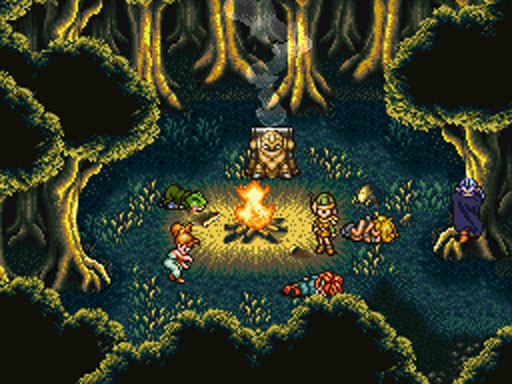
RPGFan: In the late ’90s, you became a founding member at Sacnoth to create sounds for Koudelka, possibly the only Japanese-made game set in Wales, UK. Did you and the team do any special preparations to produce a game set in a real-world location?
Hirota: I was contracted as an outsourcer at Sacnoth. I was involved in the company’s development from its inception, but I was not a part of Sacnoth. I was an independent entity. So I guess I can’t say I was a founding member.
Anyway, I recorded various sounds. For the footsteps on human bones, I bought a lot of meat with bones on it. I roasted the bones well, dried them, and let my girlfriend walk on them. Then I ate the unused meat with my friends who helped me. It was delicious. I was making gothic and horror sounds, but I recorded and edited a lot of sounds while having a lot of fun and laughing with my friends.
I have always loved the Cthulhu mythos and dark, gothic, and horror works. I’ve seen a lot of movies and read a lot of novels, so I had an idea of the sounds I needed. Just for fun, I created the right sounds for them.
RPGFan: Koudelka was a very innovative game for its time, combining elements of survival horror and RPGs. Its use of ambient sounds in lieu of traditional background music was quite a bold choice for the time, yet gave the game a very dark and distinctive atmosphere. How did you go about bringing Nemeton Abbey to life?
Hirota: As you all know, it was a groundbreaking mood piece. I’m proud to have been a part of it. However, I was only involved in sound effects, so I don’t know how it came to be. Please ask Mr. Kikuta, then president of Sacnoth and the piece’s composer.
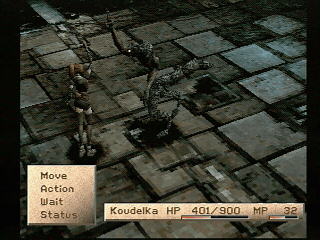
RPGFan: Following Koudelka came the iconic Shadow Hearts series, which has the distinction of being a work of historical fiction in many ways. How did that influence your compositional choices? Did you find that limiting, or did it help direct your ideas?
Hirota: That’s why I studied traditional Chinese music. But I didn’t try to make music that was true to history. I made the sounds that I liked at the time, the sounds that I wanted to make. I knew that it would work well as historical fiction. I studied traditional music and created sounds that I felt free to make. These are all mixed together to create the sound of Shadow Hearts.
There is a theme that has been consistent in my work from the past to the present. It is the fusion of the inhumanity of machines and digital technology with the physicality of human performance. For some reason, this fits in very well with the Shadow Hearts series.
RPGFan: Some of the storylines in the Shadow Hearts games were made all the more poignant due to their real-world roots. Do you have any favourite characters from the series?
Hirota: Yes, it is. It’s a very interesting story for people who like history. I do too, so I imagine many things, including Anastasia’s future. My favorite character is Roger Bacon.
RPGFan: There were some very memorable character themes across the games, from the truly heart-wrenching “ALICE” to the much more lighthearted “The Name’s Grand Papillon”! What was your process for creating such distinctive themes for each character?
Hirota: In its development, we had no plans to create a character theme. I wrote a song called “Sad mood” and applied it to a few scenes, many of which ended up having ALICE as the main scene. There is evidence of this: the scene of LiLi on the stowaway ship in the Asia Arc of the first SH also uses “ALICE.” That may sound strange if you imagine it from the name of the song. There was such a reason for it. The same was true for the other character themes. We composed the music not for the characters, but for the emotions the users felt. We named the songs as you know them when we were making the CD after development was finished.
“The Name’s Grand Papillon” was composed by Mr. Kenji Ito. It’s a great piece of music. Last year, I participated as a cellist in his 30th anniversary concert as a composer. After Shadow Hearts, I was invited by him and often participated in his arrangements for the SaGa series. I would like to have another chance to work with Mr. Mitsuda and Mr. Kenji Ito on another good piece of work.
By the way, that cello was a gift from Mr. Nobuo Uematsu, and I started playing it in my 40s. It is very fun to play an instrument after you grow up.
RPGFan: The first game in the Shadow Hearts series was known for its dark, mature themes. From the New World retained some of those themes but was overall a more light-hearted story. What led to the tonal change across the three games?
Hirota: Hmm… I don’t know the real reason, but there was a change in the work environment I felt during development. The first game was like a group of friends goofing around, but everyone was working frantically. It’s a very old-fashioned style of game development. Since Shadow Hearts: Covenant, the company became more structured and managed. For the third game, a more controlled system was established and the director was replaced in the middle of development. As a result, I feel that the weird and crazy parts of the game were hidden, and the direction and story were made to highlight the entertaining parts.
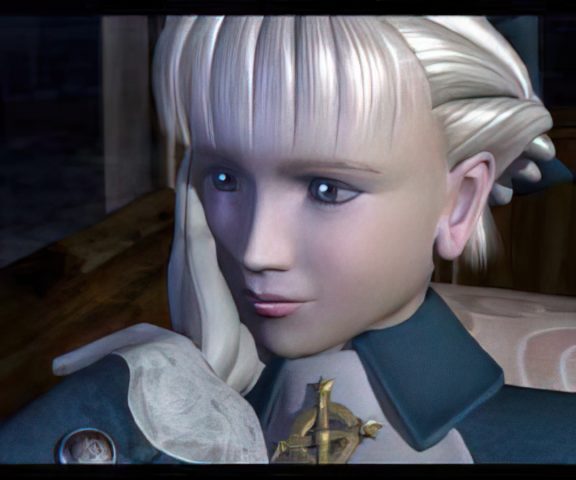
RPGFan: Koudelka and the Shadow Hearts series were breaking new ground in tone and themes. What games influenced you and your team at the time?
Hirota: I loved KOWLOON’S GATE and BAROQUE at that time. I especially loved the music of Mr. Iwata of BAROQUE, who joined us as an arranger and sound engineer. I was very happy to work with him on Shadow Hearts. They may have had a big influence on the sound. Then, of course, there is the music of Mr. Kikuta of Koudelka. I participated in Seiken Densetsu 3 as a sound effect artist, and I thought his music was really great. However, although Koudelka and Shadow Hearts are like sequels, as they have different directors and different directions.
As for Shadow Hearts, I think we were influenced a lot more by film than video games. The influence of Japanese movies of the time, such as “Shark Skin Man and Peach Hip Girl,” which was included in the Japanese version of the manual, may be significant.
RPGFan: I have always been a big fan of the Shadow Hearts OSTs; “3 Karma” has a very special place in my heart, along with “ALICE” and “Deep in Coma.” What are some of your personal favourite pieces from the soundtracks?
Hirota: Thank you. I’m sincerely glad you like them and keep listening to them. My personal favorite song is “nde/near death experience.” Then there’s “-qu-.” This was an ambient + sampling + Asian experiment. I also love “The Real Intentions” and “Veronica Vera.” Then there was “Defeat And Death” and “Un gemito dell’estinto.” I wanted to leave a lasting impression on the emotions, especially when the game is over, so I composed these songs with great care. I also like the result sound when you win a battle. I also like many of the songs myself. Of course, I also like the vocal tracks. All my songs are my children, so it’s hard to answer the question of which child is my particular favorite.
RPGFan: From the very beginning of your career, you’ve worked on music and sound design going back to some truly classic RPGs. Which games are most near and dear to your heart?
Hirota: All of them are part of my life, so I have feelings for all of them. However, the most memorable one is FFVI. I was 21 years old when I first visited SQUARE’s development room. It was a cold day with snow falling. Twenty years later, I visited Brussels, Belgium to play bass for composer Uematsu-san’s concert tour. I was in the garden near the venue checking the score of the Terra theme I was going to play that day when it started to snow. All at once, I was 21 again. Do you know the feeling? It was a very strange feeling.
RPGFan: Do you play RPGs yourself? If so, what games are you playing at the moment, or have you enjoyed playing recently?
Hirota: Unfortunately, I haven’t played many RPGs lately, but I have been playing one game called EGGLIA Rebirth, which I was involved in. The main composer of the game is Ms. Yoko Shimomura, and I also composed a few songs for it. The sound effects were created by my company. There’s also a spirit named Hirotan who looks like me. My favorite games to play during the holidays are party games that can be played with the whole family, such as Momotarō Dentetsu, which is only available in Japan.
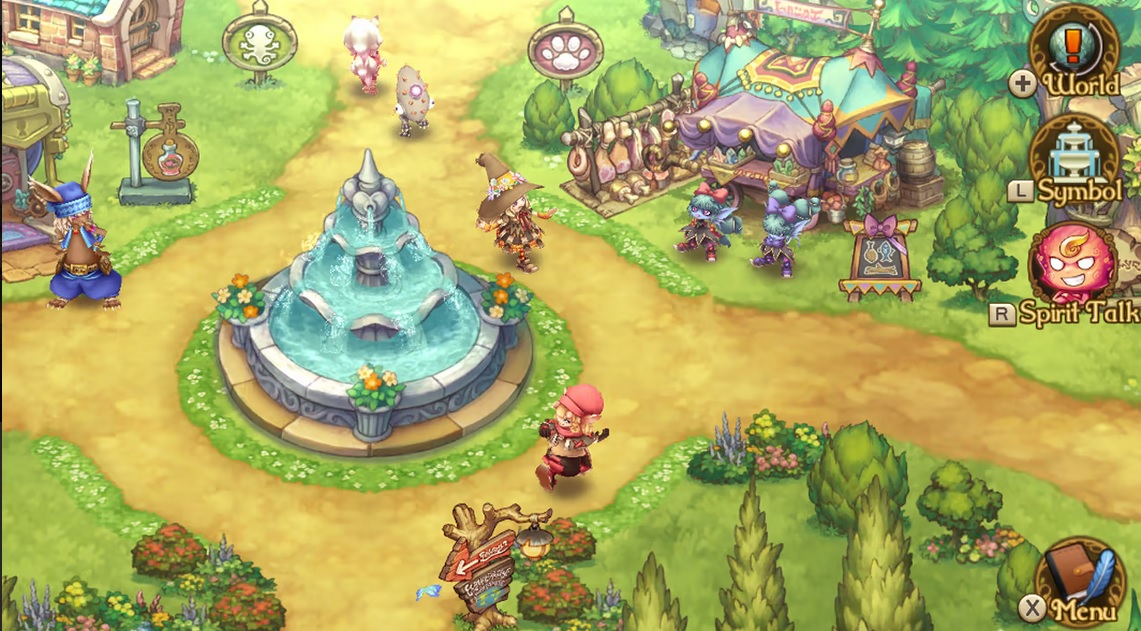
RPGFan: What’s one thing you’d like players to know about the games you’ve worked on that they might not necessarily know already?
Hirota: I am called “kulko” by some of my closest friends. I am the bass player credited as “kulko” in my soundtracks.
In Koudelka, as I remember it, there was a clock ticking in a room. I seem to remember that I rigged the sound to gradually increase in pitch. If you left it in that room for a few days, the pitch would probably rise to a climax, then go very low, and then rise again. I thought that was a spooky idea. But I don’t think anyone has demonstrated it yet, because it takes a tremendous amount of time. I don’t think it needs to be done. I’m sorry if it doesn’t change anything.
And I want to share this with you. Music and voice acting are the most impressive aspects of game sound. However, sound effects and voice editing are also tried and tested to please everyone. Music, sound effects, and voice. I want you to understand that all sounds are created by the same great talent and passion.
I wonder what the rest is… There must be something I want to talk about for each of the many games, but if I don’t get a chance to talk about them, my memory will be lost because those were decades ago. It’s sad. I think this is the case for many developers. You should frequently ask your favorite developers through social networking sites. That’s the way to preserve the video game culture for the future world.
RPGFan: Other than your contributions to sound design and composition for gaming, you’ve also been part of a band called The Earthbound Papas. Any good stories from your time with them? Being in a band and performing has to be a nice change from composing, especially when you can perform with other composers!
Hirota: Yes, Earthbound Papas is a band that Uematsu-san himself gathered his bandmates to play his own music. We went to a lot of places, America, Europe, Asia. There were a lot of fun episodes and incidents. They were really great experiences. I’m sure those stories would make a thick book. The most memorable one for me was the day of the concert in Singapore. It was my birthday that day. At Mr. Uematsu’s command, thousands of people sang a happy birthday song for me, and I was very moved. I was so happy to have so many people in so many countries listening to my performance and getting excited with me. I hope that COVID-19 will end soon and we will be able to come and go freely in the world again.
RPGFan: Looking towards the future, have you got any upcoming projects that we can look forward to?
Hirota: I’m currently working on a few projects that I’m sure many people will enjoy. Those announcements may be a bit in the future, but look forward to them. I would like to move forward with my solo project in time for you to hear it. I am also involved in many projects in my company. If you are reading this and are a developer and want good sound, please contact us. And as soon as the various projects are ready, I’ll let you all know, so please follow me on social media if you like (Twitter). Of course, I’m looking forward to sharing more with you in articles like this one.
RPGFan: It’s been an absolute pleasure to interview you, Hirota-san. Thank you so much! Have you got any closing words you’d like to say to our readers?
Hirota: I also felt very happy remembering the past. Thank you!
Thank you for reading to the end. The games you once loved are the treasures of your life. And if you play them, you can always go back to the past. If you enjoy new games and old games alike, I’ll be very happy. My job is to finish the development process, but the game is only complete when you play it and feel something. Please let us know how you feel through social media. It will make us happy and help us to create more interesting games.
We are living in difficult times, but let’s not lose heart and live strong. Let us live strong and not falter, with the video games and music we love.
RPGFan would like to thank Yoshitaka Hirota for the hard work he put into this interview, and we look forward to reporting on any upcoming titles he’s involved in. This interview has been an incredible opportunity for me on a personal level; I played Koudelka and the Shadow Hearts games as a teenager, and their music had a massive influence on me. I trained as a dancer at university and used several pieces of Hirota’s music while creating my own pieces of choreography. Be sure to check out the most recent game Hirota has worked on, EGGLIA Rebirth (coming soon), and stay tuned to RPGFan for coverage on any future projects!

